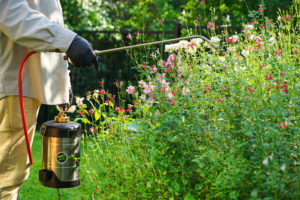All mosquitoes bite humans
According to the Centers for Disease Control and Prevention, there are about 3,500 species of mosquitoes. Some feed on plant nectar, some on reptiles, some on birds and others on mammals. Of the species that do bite humans, it is only the females that go for blood — the protein aids in egg production.
The Aedes vexans species, which is found in every U.S. state, does feed on humans, making it seem that all mosquitoes are out to get you.
For this species, “if you’re a mammal, you’re on the menu,” said Joseph M. Conlon, a retired U.S. Navy entomologist and a technical adviser to the American Mosquito Control Association.
Random fact: The mosquito featured in “Jurassic Park” wouldn’t have bitten humans or dinosaurs, Conlon said; it is the only species that doesn’t feed on blood.

Mosquito, Tick & Flea Treatments
Mosquito control solutions for residential & commercial properties in West TN. Our technicians visit your property to provide barrier sprays or misting systems, delivering protective and effective mosquito control treatments to rid your yard of mosquitoes, ticks and fleas. Learn more about our services, all of which come with a 100% satisfaction guarantee because our job is not done until you’re happy. Below are some of our most popular services.
Barrier Sprays: We surround your home in a protective barrier against mosquitoes, keeping you and your family itch free for weeks!
Flea Control: In addition to our mosquito control services, we offer flea control services to help protect your furry friends. Let be your first line of defense against these disease-carrying pests.
Tick Control: Pet owners and parents alike are concerned with tick prevention. To help mitigate that concern, our technicians create a barrier for these intruders to prevent serious complications like Lyme disease.
Special Events: Whether you’re celebrating your child’s birthday or entertaining some friends, we will make sure that your party guests enjoy your yard in a bite-free environment.
We do more than keep you bite-free at home. We offers solutions for municipalities and businesses to keep outdoor spaces comfortable for visitors. We don’t require a contract which makes it easy to use all season, or just when you want to make sure party guests are itch-free.
All-Natural Mosquito, Tick, and Flea Deterrent
We understands that not every yard is the same, which is why we offer different treatment options to fit those needs. One of these options is our all-natural treatment.
We offers an all-natural mosquito repellent as an alternative to our longer-lasting synthetic treatment. This treatment uses essential oils and garlic to repel mosquitoes, ticks, and fleas from your property. When applied the essential oils are diluted in water and become a low dose product that will allow you and your family to enjoy a bite-free yard.
Salivary Biomarkers in the Control of Mosquito-Borne Diseases
Vector control remains the most effective measure to prevent the transmission of mosquito-borne diseases. However, the classical entomo-parasitological methods used to evaluate the human exposure to mosquito bites and the effectiveness of control strategies are indirect, labor intensive, and lack sensitivity in low exposure/transmission areas. Therefore, they are limited in their accuracy and widespread use. Studying the human antibody response against the mosquito salivary proteins has provided new biomarkers for a direct and accurate evaluation of the human exposure to mosquito bites, at community and individual levels. In this review, we discuss the development, applications and limits of these biomarkers applied to Aedes- and Anopheles-borne diseases.
Insecticide resistance in mosquitoes: impact, mechanisms, and research directions.
Mosquito-borne diseases, the most well known of which is malaria, are among the leading causes of human deaths worldwide. Vector control is a very important part of the global strategy for management of mosquito-associated diseases, and insecticide application is the most important component in this effort. However, mosquito-borne diseases are now resurgent, largely because of the insecticide resistance that has developed in mosquito vectors and the drug resistance of pathogens. A large number of studies have shown that multiple, complex resistance mechanisms-in particular, increased metabolic detoxification of insecticides and decreased sensitivity of the target proteins-or genes are likely responsible for insecticide resistance. Gene overexpression and amplification, and mutations in protein-coding-gene regions, have frequently been implicated as well. However, no comprehensive understanding of the resistance mechanisms or regulation involved has yet been developed. This article reviews current knowledge of the molecular mechanisms, genes, gene interactions, and gene regulation governing the development of insecticide resistance in mosquitoes and discusses the potential impact of the latest research findings on the basic and practical aspects of mosquito resistance research.